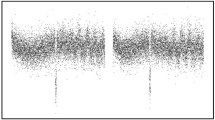Abstract
The SKA pulsar search pipeline will be used for real time detection of pulsars. Modern radio telescopes, such as SKA will be generating petabytes of data in their full scale of operation. Hence, experience-based and data-driven algorithms are being investigated for applications, such as candidate detection. Here, we describe our findings from testing a state of the art object detection algorithm called Mask R-CNN to detect candidate signatures in the SKA pulsar search pipeline. We have trained the Mask R-CNN model to detect candidate images. A custom semi-auto annotation tool was developed and investigated to rapidly mark the regions of interest in large datasets. We have used a simulation dataset to train and build the candidate detection algorithm. A more detailed analysis is planned. This paper presents details of this initial investigation highlighting the future prospects.














Similar content being viewed by others
Notes
References
Bank D., Koenigstein N., Giryes R. 2020, Autoencoders, https://doi.org/10.48550/ARXIV.2003.05991
Bates S. D., Bailes M., Barsdell B. R., et al. 2012, Month. Not. R. Astronom. Soc. 427, 1052
Bhat S. S., Prabu T., Saha S. 2020, in 2020 XXXIIIrd General Assembly and Scientific Symposium of the International Union of Radio Science, p 1
Buch K. D., Bhatporia S., Gupta Y., et al. 2016, J. Astronom. Instrument. 5, 1641018
Buch K. D., Kale R., Naik K. D., et al. 2022, J. Astronom. Instrument. 11, https://doi.org/10.1142/s2251171722500088
Buch K. D., Naik K., Nalawade S., et al. 2019, J. Astronom. Instrument. 8, 1940006
Buch K. D., Naik K., Nalawade S., et al. 2018, IETE Tech. Rev. 36, 225
Cunningham P., Delany S. J. 2022, ACM Comput. Surv. 54, 1
Dewdney P. 2016, SKA1 System Baseline Design, SKA-TEL-SKO-0000002
Dutta A., Zisserman A. 2019, in Proceedings of the 27th ACM International Conference on Multimedia, MM ’19 (New York, NY, USA: ACM)
Girshick R. 2015, Fast R-CNN, https://doi.org/10.48550/ARXIV.1504.08083
Gurney K. 1997, An Introduction to neural Networks, https://www.inf.ed.ac.uk/teaching/courses/nlu/assets/reading/Gurney_et_ al.pdf
He K., Gkioxari G., Dollár P., Girshick R. 2017, Mask R-CNN, https://doi.org/10.48550/ARXIV.1703.06870
He K., Zhang X., Ren S., Sun J. 2015, Deep Residual Learn. Image Recogn. https://doi.org/10.48550/ARXIV.1512.03385
Hearst M., Dumais S., Osuna E., Platt J., Scholkopf B. 1998, IEEE Intell. Syst. Appl. 13, 18
Jain A. K. 2008, in Machine Learning and Knowledge Discovery in Databases, eds Daelemans W., Goethals B., Morik K. (Berlin, Heidelberg: Springer Berlin Heidelberg), p. 3
Keith M. J., Jameson A., Straten W. V., et al. 2010, Mon. Not. R. Astron. Soc. 409, 619
Krizhevsky A., Sutskever I., Hinton G. E. 2012, in Advances in Neural Information Processing Systems 25, eds Pereira F., Burges C. J. C., Bottou L., Weinberger K. Q. (Curran Associates, Inc.), p. 1097
Labate M. G., Waterson M., Swart G., Bowen M., Dewdney P. 2019, The Square Kilometre Array Observatory, 2019 IEEE International Symposium on Antennas and Propagation and USNC-URSI Radio Science Meeting, Atlanta, GA, USA, p. 391, https://doi.org/10.1109/APUSNCURSINRSM.2019.8888528.
Levin L., Armour W., Baffa C., et al. 2017, Proceedings of the International Astronomical Union, 13, p. 171
Lin T.-Y., Dollár P., Girshick R., et al. 2016, Feature Pyramid Netw. Object Detect. https://doi.org/10.48550/ARXIV.1612.03144
Lin T.-Y., Maire M., Belongie S., et al. 2014, Microsoft COCO: Common Objects in Context, https://doi.org/10.48550/ARXIV.1405.0312
Lyon R. J., Stappers B. W., Cooper S., Brooke J. M., Knowles J. D. 2016, Monthly Notices of the Royal Astronomical Society, 459, 1104
Lyon R. J., Stappers B. W., Levin L., Mickaliger M. B., Scaife A. 2018, A Processing Pipeline for High Volume Pulsar Data Streams, https://doi.org/10.48550/ARXIV.1810.06012
Misra S., Kristensen S. S., Søbjærg S. S., Skou N. 2007, 2007 IEEE International Geoscience and Remote Sensing Symposium, 2714
Misra S., Ruf C., Kroodsma R. 2008, in IGARSS 2008, IEEE International Geoscience and Remote Sensing Symposium, Vol. 2, p. II-335
Moon T. 1996, IEEE Signal Processing Magazine, 13, 47
Quinlan J. R. 1986, Induction of Decision Trees, https://www.hunch.net/~coms-4771/quinlan.pdf
Ransom S. M. 2001, Fast Search Techniques for High Energy Pulsars, https://doi.org/10.48550/ARXIV.ASTRO-PH/0112006
Ransom S. M., Eikenberry S. S., Middleditch J. 2002, The Astronomical Journal, 124, 1788
Ren S., He K., Girshick R., Sun J. 2015, Faster R-CNN: Towards Real-Time Object Detection with Region Proposal Networks, https://doi.org/10.48550/ARXIV.1506.01497
Sutton R. S. 2005, History of Reinforcement Learning, http://www.incompleteideas.net/book/ebook/node12.html
Thiagaraj P., Stappers B., Ghalame A., et al. 2020, in 2020 XXXIIIrd General Assembly and Scientific Symposium of the International Union of Radio Science, IEEE, p. 1
Acknowledgements
We would like to thank the anonymous referee whose comments have vastly enhanced the quality of this manuscript. We would also like to thank Raman Research Institute, University of Manchester, PES University and BITS Goa, for their support.
Author information
Authors and Affiliations
Corresponding author
Additional information
This article is part of the Special Issue on “Indian Participation in the SKA”.
Rights and permissions
About this article
Cite this article
Bhat, S.S., Prabu, T., Stappers, B. et al. Investigation of a Machine learning methodology for the SKA pulsar search pipeline. J Astrophys Astron 44, 36 (2023). https://doi.org/10.1007/s12036-023-09920-4
Received:
Accepted:
Published:
DOI: https://doi.org/10.1007/s12036-023-09920-4




